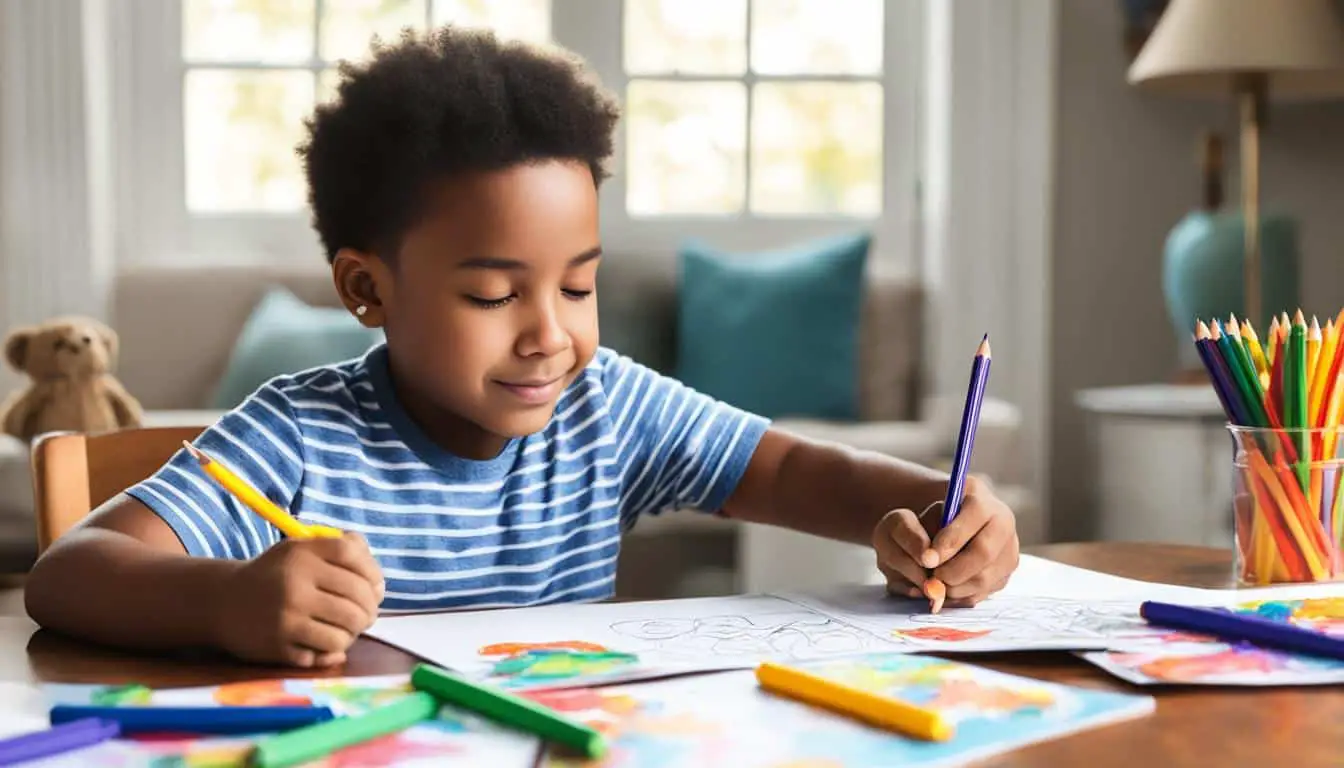
Understanding and Coping with Childhood Anxiety
As a professional in child psychology, I know firsthand the challenges that come with childhood anxiety. Anxiety in children is more common than you may think, and it can manifest in a variety of ways, from separation anxiety to performance anxiety. It’s crucial to understand how to recognize anxiety in children, and to have effective coping strategies to support them.
Childhood anxiety can have a significant impact on a child’s life, affecting everything from their academic performance to their social skills. As a parent or caregiver, there are steps you can take to help children manage their anxiety and thrive.
In this article, we’ll explore childhood anxiety, its possible causes and triggers, and the most effective coping strategies to support children in managing their fears and worries.
Key Takeaways:
- Childhood anxiety can manifest in a variety of ways and impact many aspects of a child’s life.
- Understanding childhood anxiety and its causes is essential in supporting children’s mental health.
- Effective coping strategies, such as relaxation techniques and cognitive-behavioral strategies, can help children manage their anxiety.
- As a parent or caregiver, it’s important to recognize the signs of childhood anxiety and provide support and guidance for children.
- By implementing appropriate coping strategies, we can help children navigate their fears and anxieties in a positive and healthy way.
Recognizing Childhood Anxiety
Childhood anxiety can manifest in various ways, and it is crucial for parents and caregivers to recognize the signs and symptoms. Below are some common signs of childhood anxiety:
| Signs of Childhood Anxiety | Anxiety Symptoms in Children |
|---|---|
| Excessive worrying about everyday activities | Asking frequent “What if?” questions |
| Physical complaints, such as headaches or stomach aches | Insomnia or difficulty falling asleep |
| Avoidance of situations or activities that may trigger anxiety | Clinginess or reluctance to leave a parent or caregiver |
| Perfectionism | Excessive self-criticism or fear of failure |
It is important to note that anxiety symptoms in children may differ from those in adults and can be sometimes difficult to recognize. Children may not be able to express their emotions clearly, making it challenging for parents and caregivers to identify the root cause of their anxiety.
“Anxiety isn’t an easy or comfortable topic to talk about with children. But it’s crucial we do so in a compassionate, non-judgmental way.
– Dr. Lisa Damour, psychologist and author
If you notice some of these symptoms persisting over time, it is essential to seek professional help from a qualified mental health professional. Identifying and addressing childhood anxiety early on can help children develop healthy coping strategies and improve their overall well-being.
Causes and Triggers of Childhood Anxiety
Childhood anxiety can be caused by various factors, including genetic, environmental, and situational influences.
Genetic Factors
Research suggests that genetics play a role in the development of anxiety. Children with a family history of anxiety disorders are more likely to experience anxiety themselves. However, genetics alone do not determine a child’s anxiety levels; environmental factors also play a significant role.
Environmental Factors
The environment a child grows up in can also contribute to the development of anxiety. Stressful family dynamics, traumatic events, and exposure to violence or abuse can all trigger anxiety in children. Additionally, parental anxiety can also impact a child’s anxiety levels, as anxious parents may unintentionally model anxious behavior.
Situational Triggers
Specific situations can also trigger anxiety in children. Common triggers include academic stress, social pressures, and changes in routine or environment. Medical conditions, such as chronic illnesses or allergies, can also trigger anxiety in children, as can certain medications.
Understanding the possible causes and triggers of childhood anxiety can help parents and caregivers proactively support their children’s mental health and well-being. By creating a supportive and nurturing environment and equipping children with effective coping skills, we can help them manage their anxiety and thrive.

Effective Coping Strategies for Childhood Anxiety
As a caregiver, helping children develop coping skills can make all the difference in managing anxiety. Here are some effective anxiety management techniques that can help:
- Relaxation Techniques: These may include deep breathing, meditation, and progressive muscle relaxation. Engaging in physical exercises such as yoga can also be an effective way to manage anxiety.
- Cognitive-Behavioral Strategies: Such techniques include cognitive restructuring, exposure therapy, and thought stopping. They help children develop positive coping mechanisms and counter negative thought patterns that often contribute to anxiety.
- Developmental Strategies: These approaches aim to teach children problem-solving techniques and the ability to adapt to challenging situations. Helping children build their self-esteem, confidence, and social competence can also reduce anxiety levels.
- Mindfulness: Practicing mindfulness encourages children to focus on the present moment and develop non-judgmental awareness. Mindfulness meditation and exercises can help children regulate their emotions and manage anxiety.
- Seek Professional Help: In some cases, anxiety may be severe and require professional intervention. Consider seeking therapy or psychological counseling to help manage anxiety in children.

Implementing these coping skills for children can go a long way in managing anxiety. It is essential to help children develop coping mechanisms that allow them to deal with their anxieties positively and healthily.
Conclusion
In conclusion, I hope this article has shed light on the importance of understanding childhood anxiety and the role that parents and caregivers can play in helping children cope with their fears and worries. It is crucial to recognize the signs and symptoms of childhood anxiety and understand the various factors that can trigger it. By teaching children effective coping strategies, such as relaxation techniques and cognitive-behavioral strategies, we can empower them to manage their anxieties in a positive and healthy way.
Remember, childhood anxiety is a common issue that affects many children. As parents or caregivers, we should strive to create a supportive and safe environment for children to express their anxieties and feelings. By doing so, we can help them build resilience and confidence to overcome their fears and anxieties.
Thank you for reading and I hope you found this article informative and helpful in your journey towards supporting your child’s mental well-being.
FAQ
What is childhood anxiety?
Childhood anxiety refers to excessive and persistent worry, fear, or stress experienced by children. It can manifest in various forms, such as separation anxiety, social anxiety, generalized anxiety disorder, or specific phobias.
How can I recognize childhood anxiety?
Look out for signs such as frequent restlessness, excessive worrying or fearfulness, avoidance of certain situations, physical symptoms like stomachaches or headaches, trouble sleeping, or changes in behavior or mood.
What are the potential causes and triggers of childhood anxiety?
Childhood anxiety can be influenced by multiple factors, including genetics, brain chemistry, life experiences (such as trauma or major life changes), family dynamics, and environmental stressors. Triggers can vary from person to person and may include specific situations, events, or thoughts.
How can I help my child cope with anxiety?
There are several effective coping strategies that can benefit children with anxiety. These include teaching relaxation techniques like deep breathing exercises or progressive muscle relaxation, promoting healthy lifestyle habits such as regular exercise and adequate sleep, helping children challenge and reframe negative thoughts, providing a supportive and nurturing environment, and seeking professional help when necessary.
Are there specific coping skills for children with anxiety?
Yes, there are various coping skills that can be beneficial for children with anxiety. Some examples include practicing mindfulness and grounding exercises, creating a calming routine, using visual aids like worry jars or calming cards, engaging in creative outlets like art or writing, and encouraging open communication about their fears and worries.
How can cognitive-behavioral strategies help children with anxiety?
Cognitive-behavioral strategies focus on identifying and challenging negative thought patterns and behaviors. These techniques help children reframe their anxious thoughts and develop more positive and adaptive responses. For example, they may learn to replace anxious thoughts like “I can’t do it” with more realistic thoughts such as “I can try my best.”
When should I consider seeking professional help for my child’s anxiety?
If your child’s anxiety is significantly interfering with their daily life, causing distress, or lasting for an extended period, it may be beneficial to seek professional help. A mental health professional, such as a pediatrician, psychologist, or therapist, can provide a thorough assessment and offer appropriate interventions and support.
How important is it to involve caregivers and educators in managing childhood anxiety?
Involving caregivers and educators is crucial in managing childhood anxiety. By working together, they can provide consistent support, create a safe and understanding environment, reinforce coping strategies, and collaborate on interventions that address anxiety-related challenges at home and school.